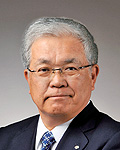Messages from Keidanren Executives and Contributed articles to Keidanren Journals April, 2013 What should we expect of new employees?

Spring is the time of year when you can see smartly dressed young men and women on their way to work. They have probably just started their first job and are full of ambition and ideals as they begin a new stage in their lives. What do their employers expect of them?
I think employers used to expect their new employees, including me when I started my job, to rigidly pursue corporate goals. Most of all, they wanted them to boost the bottom line as quickly and as much as possible in line with the company's established business model.
Today, however, Japan faces a period of unprecedented change, be it in the form of a low birth rate, societal aging, or a declining population. Almost every company has had to rethink its business model. So employers, more than ever, should be expecting their new employees to be flexible and to bring with them new values and a new perspective.
Young people can be immature and unrefined at times. However, I strongly feel that the challenges facing Japanese companies and the speed at which they will need to respond to these mean that unless the innovativeness and boldness that come from just such immaturity and unrefinedness combine with wide experience and the refined judgment that come from their senior colleagues, Japanese companies will not be able to rise to these challenges.
By 2030 the number of middle-income earners (i.e., those spending between $10 and $100 a day) in the Asia-Pacific region is expected to rise to some 3.2 billion (roughly 70% of the global total). It is clear that this region is going to become the battleground for business and that those aged between 20 and 30 years old are going to become the key generation in many emerging economies in Asia. They will have grown up taking for granted the free flow of information across borders via the Internet, and their shared views and needs in terms of goods and services are likely to be key to developing new business.
People of my generation are apt to use the words "young people these days" rather critically. However, I think we should see young people these days as a flexible human resource and hope that employers will make the most of this resource to bring about changes at home and come out top in the battle for business in the Asia-Pacific region.

